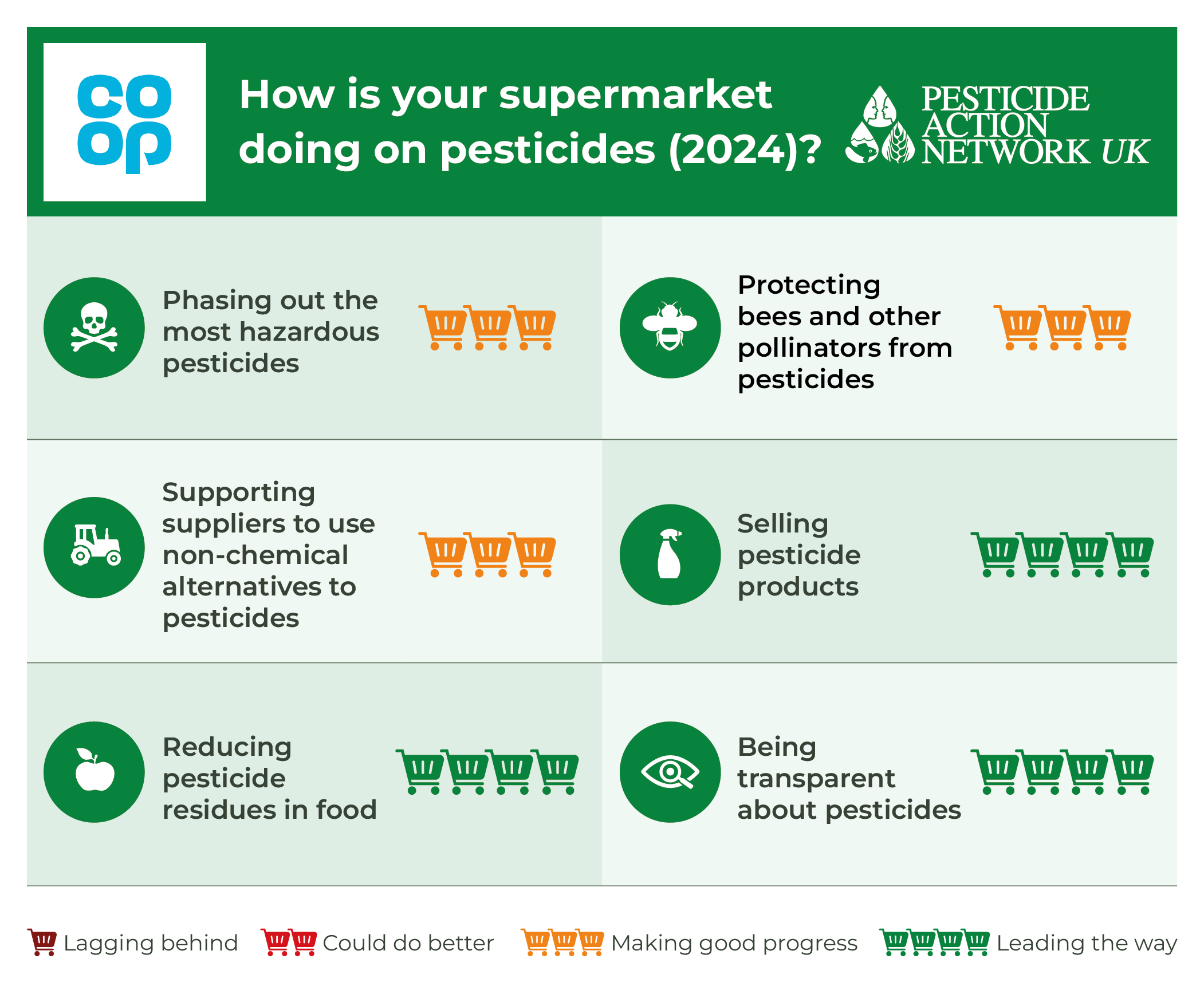Co-op
Co-op received a good overall score and came third out of ten supermarkets in the 2024 ranking, maintaining its position from the previous ranking in 2021. While there is still more work to do, Co-op is making good progress in terms of protecting the health of consumers, agricultural workers and the environment from pesticides.

What is Co-op doing well?
Phasing out Highly Hazardous Pesticides
- Co-op’s approach is focused on phasing out the use of Highly Hazardous Pesticides from its supply chain. The company uses the results from its residue testing programme to prioritise which chemicals to target for phase out. This means that its efforts are primarily targeted at reducing the use of some of the most harmful pesticides which are being detected in the food it sells. It also considers pesticide residues in flowers. Co-op uses the results from its residue testing programme to determine which growers to provide with additional support to help them reduce pesticide use and adopt non-chemical alternatives. The company told PAN UK that its approach, which is relatively new, is already delivering meaningful reductions in pesticide use and associated harms.
- As part of its approach to protecting workers in its supply chain, the Co-op has identified 15 Highly Hazardous Pesticides that pose a particular risk to human health. The list includes chemicals that are acutely toxic (which means they can be harmful after a single episode of ingestion, inhalation or skin contact) in addition to those that have links to chronic diseases such as cancer. Suppliers wanting to use these pesticides must provide Co-op with a phase out plan which includes measures designed to mitigate health impacts while the chemical is being phased out of use.
Supporting suppliers to use non-chemical alternatives to pesticides
- Co-op has funded research into non-chemical alternatives to pesticides and provides some training and guidance to its suppliers on the topic. The company also offers bespoke advice on pesticide reduction to some suppliers and runs forums which bring suppliers together to share best practice. It has used a range of techniques to phase out the use of some particularly toxic pesticides from specific supply chains. For example, it has ended the use of twelve Highly Hazardous Pesticides in bananas and pineapples. It is also reducing the use of fungicides (which are designed to prevent fresh food from rotting) through a range of measures, including keeping its supply chains as short as possible.
Reducing pesticide residues in food
- Co-op tests a range of food types for pesticide residues including fruit, vegetables, herbs, spices, nuts and wheat products such as bread and pasta. When this testing detects a residue that reaches half of the legal safety limit, or when the residues of more than five different pesticides are found on one food item, an investigation is triggered. This includes working closely with the supplier to understand and tackle the problem, and sharing any learnings across the supply chain.
Protecting bees and other pollinators from pesticides
- Co-op provides some support to help suppliers better protect bees and other pollinators from pesticides. This has included farm visits with suppliers and the Bumblebee Conservation Trust looking at how to encourage more pollinators.
Selling pesticide products
- It is one of three UK supermarkets which has stopped selling synthetic pesticide products in its gardening and pet ranges. It also doesn’t sell biocidal products (such as ant sprays or cockroach powders) which contain hazardous pesticides.
Being transparent about pesticides
- It got full marks for transparency because it publishes its full pesticide policy, the results from its residue testing programme and the lists of which pesticides it has prioritised for phase out.
What are Co-op’s priority areas for improvement?
Phasing out Highly Hazardous Pesticides
- Co-op does not currently prohibit the use of any pesticides within its global supply chain. Instead, the company has chosen to focus on phasing out the use of 23 Highly Hazardous Pesticides with the long-term goal of eliminating them entirely. However, despite making significant progress on phasing out these 23 chemicals on specific crops (such as bananas and pineapples) in particular high-risk regions none of them have been removed from use entirely yet.
- The list of pesticides that Co-op chooses to target for phase out is based largely on results from its residue testing programme (in other words the pesticides that are being detected on or in the food it sells). However, it is perfectly possible to use toxic pesticides without them appearing in food. While farming and food processing practices can eliminate residues, this does nothing to prevent the environmental or health impacts where the food is grown. Co-op should look beyond residues to broaden out its criteria for selecting which pesticides to reduce, and ultimately phase out, from its supply chains. The company told PAN UK that it is reviewing how it can incorporate broader environmental and health criteria into its efforts to phase out the most harmful pesticides from its supply chains.
Protecting farmworkers from pesticides
- Like all UK supermarkets, Co-op could be doing more to monitor pesticide poisonings and protect the health of agricultural workers involved in its supply chains. While its suppliers must complete a human rights focussed self-assessment questionnaire which includes questions regarding the impacts of pesticides on worker well-being, gaining an understanding of the true extent of worker poisonings remains a challenge. The company told PAN UK that it is currently developing stronger measures designed to protect farmworkers from pesticide exposure. These include better tools for monitoring worker poisonings and mechanisms for involving workers directly in health and safety processes.
Protecting bees and other pollinators from pesticides
- Co-op could be doing more to protect bees and other pollinators from pesticides. While it prioritises three neonicotinoids (the insecticides notorious for driving declines in pollinator populations worldwide) and a number of other highly bee-toxic chemicals for phase out, these chemicals are still used in its global supply chains. Suppliers wanting to use them must conduct a risk assessment and implement an action plan which minimises the risk to pollinators. However, given the global biodiversity crisis which is impacting pollinators particularly harshly, all supermarkets should be doing more to phase out these chemicals from use across their global supply chains.
- Co-op does not fund research on the impacts of pesticides on pollinators. While the company does encourage its suppliers to monitor pollinator activity on their farms, it should upgrade this to a requirement.
- Pesticides are still sprayed around Co-op stores and car parks with the aim of controlling weeds. However, the company is currently trialling non-chemical alternatives (hand weeding and pelargonic acid which is low risk) and told PAN UK that it plans to review its position once the trials have been completed. To help biodiversity flourish, the company should phase out the use of pesticides around all its stores as soon as possible.













